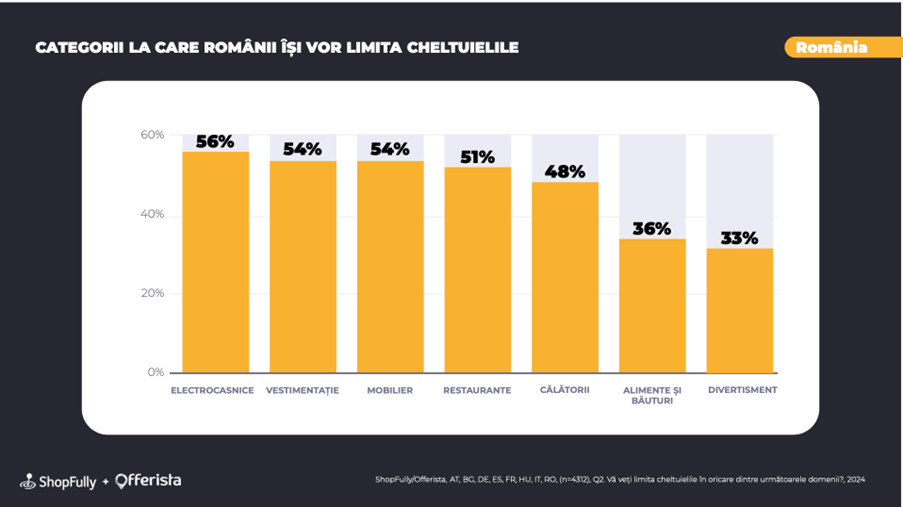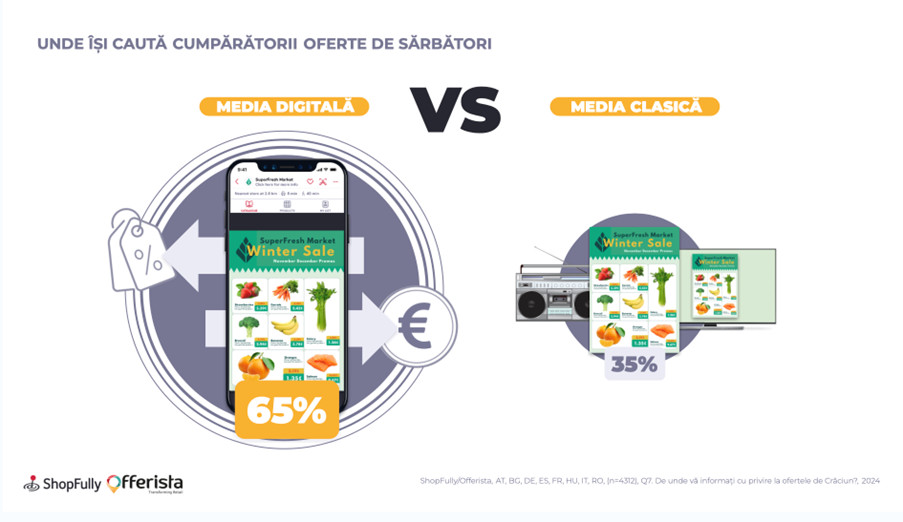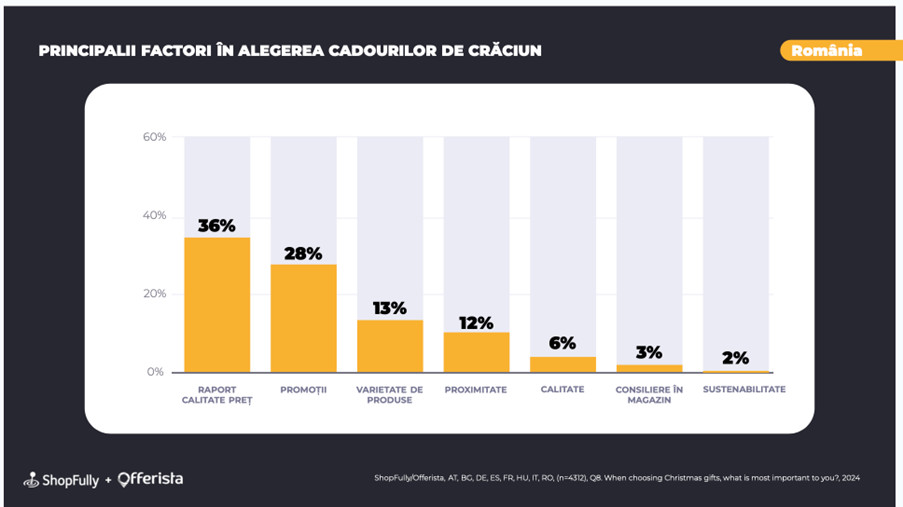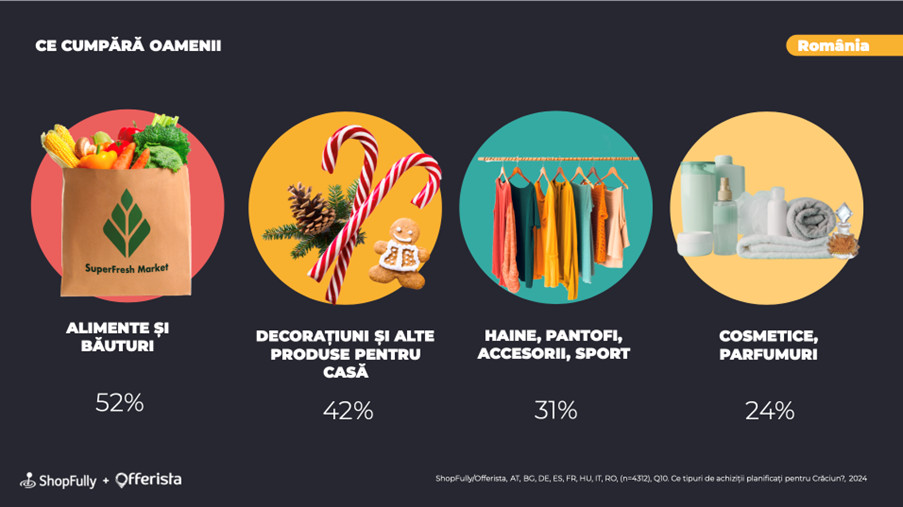The holidays are an opportunity to meet with loved ones, but also one of the most intense shopping periods of the year. This year, however, they also come with financial concerns, as revealed by the latest Offerista study, carried out at European level.
2024 Holiday Shopping Report was conducted online in September and October 2024, through applications owned by ShopFully and Offerist and targeted consumers aged 18+ from 8 European markets (Austria, Bulgaria, Germany, France, Hungary, Italy, Romania, Spain and Hungary), collecting data from a nationally representative sample for each country .
The study highlights how European consumers are managing their spending decisions this year and reveals a landscape shaped by economic pressures, strategic budgets and ever-evolving shopping preferences, providing essential insights for brands and retailers looking to connect effectively with consumers.
Romanians, like the rest of the Europeans, are worried about financial aspects, including in the context of the holidays
This year’s holidays are influenced, at the European level, by the economic concerns of consumers, which have a direct impact on the way they choose to plan their expenses at the end of the year, with most declaring that they intend to drastically reduce the budget for certain categories of shopping.
Inflation is a major concern across Europe, with France (85%) reporting the greatest concern, followed closely by Spain (76%) and Italy (73%). Rising costs, the price of energy and personal financial pressures are influencing shoppers to focus on essential spending, especially food and drink.
Consumers in Romania reported similar concerns when thinking about this year’s holiday season, 72% of respondents stating that the main issue that worries them is price rise/inflationfollowed by 56% increase in energy/gas prices. Health is in third place, with 39%but closely followed by fears about own financial situation, with 35%.
Amid worries about finances, many people are focusing their holiday budgets on essentials while cutting back on discretionary spending and over 90% of the Romanians declared that they will limit spending to categories of purchases such as: household appliances (56%), clothing (54%), furniture (54%), restaurants (51%), travel (48%).
Also, over a third of Romanians (37%) will start shopping earlier this year, the main reason for this approach being staggering EXPENDITURE (46%), closely followed by the desire to have more time available for purchasing planning (40%), the third reason being avoiding last-minute stress (35%).
The impact of the economic situation is strongly felt by Romanians in 202411% of these declaring that do not plan to do any Christmas shopping this year due to reduced purchasing power.
Digital media is the main channel for information related to promotions, but Romanians do their shopping predominantly in physical stores
At the European level, and Romania is no exception, consumers are increasingly turning to digital sources to find out about promotions and offers, with digital media having almost double the use of traditional media.
Thus, in order to find out information about Christmas offers, Romanian consumers prefer to find out from official websites of stores/brands (53%)followed by social media (33%) and only then TV (28%) and press (21%).
Meanwhile, when it comes to finding holiday shopping inspiration, the shops locale lead the top of Romanians’ preferences (43%), closely followed by the channels of social media cu 38% and only on the third place of TV cu 30 %
Romanians prefer to see and test what they buy, so even when it comes to holiday shopping, most (59%) will make the purchases in magazine bodyjust over a third (34%) they said they would shop both in stores and online and only 7% exclusively online.
„This combined reliance on digital search and a hybrid approach to shopping reflects how European consumers navigate their search for value. The hybrid purchase is clearly on the rise in Romania, but the trend of information from digital sources is strong and shows that, although the Romanian consumer still prefers to see the product before the purchase, the process of selecting and preparing the list is carried out predominantly ( and increasingly) online. And this aspect makes it essential how retailers and brands present their offers in the digital environment and the ways they choose to make them reach consumers in relevant contexts” he stated Cătălin PațachiaCountry Manager Offerista Romania.
What will Romanians buy for the holidays and what budgets will they allocate in 2024
In response to inflation, many European consumers are taking a proactive and strategic approach to holiday shopping, taking advantage of offers and promotions to optimize their budgets.
Romanians are no exception, and when it comes to Christmas gifts, the most important aspects for them are value for money (36%), promotions (28%) and the variety of the offer that offers them the possibility to purchase everything in one place (13%).
This year, due to the economic situation, almost two thirds of Romanian consumers will allocate the same budget for holiday shopping as in 2023 (65,13%)while almost 20% of consumers will allocate one lower overall budget.
The smaller holiday budget will mean that this year consumers intend to spend less on each gift (35%)they will choose totally different products at a lower price (29%) or they will opt for cheaper alternatives of the same products (20%)and for brands it will mean an even greater pressure to succeed in reaching consumers with their own offers, in order to convince them.
“With the hybrid approach to shopping and price priority to meet economic pressures, the key to the success of holiday campaigns will lie in relevance and effectively connecting brands with consumers. A full-funnel approach, covering the entire season and building momentum towards key shopping weeks, delivered across multiple relevant channels can make the difference between a promotion that stands out, persuades and converts, and one that gets lost in the plethora of offers and communications. This year’s reduced consumer budgets put even more pressure on brands and retailers to communicate on the channels where consumers are looking for deals” he added Cătălin PațachiaCountry Manager Offerista Romania.
In absolute terms, almost 40% of Romanian consumers intend to spend between 500-1,000 lei for shopping for christmas, 24% have a total budget allocated by under 500 leiwhile 22% will spend between 1,000-2,000 lei this year for the holidays.
The main categories of purchases that Romanians have in mind for the holidays are food and drinks (52%), decorations and other home products (42%), clothes, shoes, accessories, sports (31%), cosmetics and perfumes (24%) and toys (20%).
The final report of the Offerista study 2024 Holiday Shopping Report includes more information and an analysis of the preferences, habits and priorities of European and Romanian consumers in the 2024 holiday shopping season.
Offeristthe European market leader in the Digital Retail Marketing segment, has been present on the Romanian market since 2019, offering complete digital services to connect buyers looking for offers with retailers.
Offerista Group provides integrated digital communication services for brands and retailers, using cutting-edge technology solutions, adapted to the local market and constantly improved, and benefits from the expertise of a team of 150 senior professionals, at network level.
combining Offerista Native Network (network of portals and mobile applications that aggregate catalogs or retail offers), social media, GDN and strategic partnerships concluded with over 1400 publishers from different sectors (recipe portals, loyalty card applications, news sites, lifestyle, DIY, etc.), Offerista Group offers retailers a diversified and measurable reach, reaching up to 90% of the total audience online from Romania.
Offerista Group addresses both retailers and brands present on their shelves, currently collaborating on the local market with renowned companies such as Kaufland, Penny, Auchan, JYSK, DM, PEPCO, KiK, Fressnapf and others.
Source: www.iqads.ro







